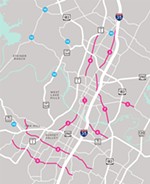The Odds on Mayor Adler’s $720 Million Mobility Bond
Is the plan just daring enough to work?
By Michael King, Fri., Oct. 28, 2016
(Page 5 of 5)
The mayor said Falk has privately apologized to him for the charge of "dishonesty," but the HTS advertising remains unchanged. In frustration, Adler described arguing with Falk "like talking to a climate change denier." That might be because he was indeed talking to a climate change denier.
The HTS list of opponents also includes former Travis County Judge Bill Aleshire, disappointed 10-1 Council candidates Ed English and Bill Worsham, and former Land Commissioner Jerry Patterson. The most prominent name remains Council Member Houston, who has issued a couple of broadsides against the bond process, as not "inclusive" nor "transparent," and conceived by an "exclusive group of power brokers." Asked to elaborate about the latter charge, Houston declined to cite names but described "the coalition" as comprised of the "enthusiastic interest groups" that are nonetheless "not very diverse in their memberships," as well big Downtown players like RECA and the Downtown Austin Alliance. (Worth noting is that the Black Austin Democrats, the Tejano Democrats, and all three minority Chambers of Commerce are supporting the bond.) Houston also said she is not persuaded that the localized neighborhood public engagement that is reflected at the beginning of each of the corridor plans is sufficient in garnering diverse public support for the projects.
Houston says she would like to have seen more funding for work on MLK Boulevard and FM 969, and for collaboration with Capital Metro on a northeast Green park-and-ride rail line. Primarily, she proposes going back to the beginning of the process for more inclusiveness. "This is the way we've always done business as a city," Houston said. "Somebody needs to say it's not right."
Doing Something
The mayor and other supporters of the bond insist that "doing nothing" – which they charge is the thread running through most of the opposition – is simply not an option, and that decades of doing nothing is precisely how we've come to this extremely congested pass. Yet even while he fends off attacks from the anti-any-tax onslaught, he's met on another flank by those who argue that the plan doesn't really do enough, or does too many of the wrong things. A few days ago, the mayor responded to skepticism from Austin Neighborhoods Council leaders by promising the corridors and subsequent density would still not impinge on traditional, single-family neighborhoods. That evoked plenty of social media buzz from new urbanist sources arguing that, in light of Austin's continuing population growth, Adler was promising something he couldn't – and moreover shouldn't – deliver.
Somewhat in that vein, software entrepreneur and public policy advocate Julio Gonzalez Altamirano recently took a deeply analytical look at the bond project proposals on his blog, Keep Austin Wonky. The post is indeed wonkishly steeped in data analysis, and makes quite a few assumptions about vehicle use, commuter habits, and what is likely to happen several years forward, to argue its rather disappointing conclusion: "The 'Go Big' mobility bond will increase the single-occupant vehicle share of Austin work commutes." Nevertheless, for anybody hoping for substantial near-term "mode shift" in the way area residents use transportation (fewer single-occupant commuters; more pooling, sharing, transit, biking, etc.) – Gonzalez Altamirano concludes, it ain't gonna happen because of this bond. The negative change he predicts – "a net increase of 1,853 SOV commuters" – isn't enormous, and indirectly suggests that the projects will indeed somewhat ease congestion for vehicle commuters.
But for folks truly interested in moving Austin toward a more multimodal, driveable/bikeable/walkable and ultimately more sustainable and resilient city, we might well be waiting still for public enthusiasm for a major investment in mass transit: rail, buses, gondolas ... or whatever. If voters approve this bond and the work gets done, Austin will have accomplished major roadway and neighborhood improvements, but a great leap forward is more than anyone should expect. To quote the mayor: "Almost wherever you are, this is the next thing that has to happen." As both critics and supporters acknowledge, it is certainly not the last.
See endorsements and more election news at austinchronicle.com/elections.
Got something to say on the subject? Send a letter to the editor.










